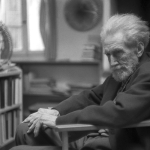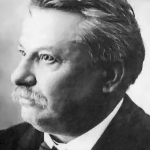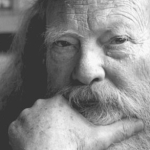A Lady asks me
I speak in season
She seeks reason for an affect, wild often
That is so proud he hath love for a name
Who denys it can hear the truth now
Wherefore I speak to the present knowers
Having no hope that low-hearted
Can bring sight to such reason
Be there not natural demonstration
I have no will to try proof-bringing
Or say where it hath birth
What is its virtu and power
Its being and every moving
Or delight whereby ‘tis called “to love”
Or if man can show it to sight.
Where memory liveth,
it takes its state
Formed like a diafan from light on shade
Which shadow cometh of Mars and remaineth
Created, having a name sensate,
Custom of the soul,
will from the heart;
Cometh from a seen form which being understood
Taketh locus and remaining in the intellect possible
Wherein hath he neither weight nor still-standing,
Descendeth not by quality but shineth out
Himself his own effect unendingly
Not in delight but in the being aware
Nor can he leave his true likeness otherwhere.
He is not vertu but cometh of that perfection
Which is so postulate not by the reason
But ‘tis felt, I say.
Beyond salvation, holdeth his judging force
Deeming intention to be reason’s peer and mate,
Poor in discernment, being thus weakness’ friend
Be it withstayed
and so swinging counterweight.
Not that it were natural opposite, but only
Wry’d a bit from the perfect,
Let no man say love cometh from chance
Or hath not established lordship
Holding his power even though
Memory hath him no more.
Cometh he to be
when the will
From overplus
Twisteth out of natural measure,
Never adorned with rest Moveth he changing colour
Either to laugh or weep
Contorting the face with fear
resteth but a little
Yet shall ye see of him That he is most often
With folk who deserve him
And his strange quality sets sighs to move
Willing man look into that forméd trace in his mind
And with such uneasiness as rouseth the flame.
Unskilled can not form his image,
He himself moveth not, drawing all to his stillness,
Neither turneth about to seek his delight
Nor yet to see out proving
Be it so great or so small.
He draweth likeness and hue from like nature
So making pleasure more certain in seeming
Nor can stand hid in such nearness,
Beautys be darts tho’ not savage
Skilled from such fear a man follows
Deserving spirit, that pierceth.
Nor is he known from his face
But taken in the white light that is allness
Toucheth his aim
Who heareth, seeth not form
But is led by its emanation
Being divided, set out from colour,
Disjunct in mid darkness
Grazeth the light, one moving by other,
Being divided, divided from all falsity
Worthy of trust
From him alone mercy proceedeth.
Go, song, surely thou mayest
Whither it please thee
For so art thou ornate that thy reasons
Shall be praised from thy understanders,
With others hast thou no will to make company.
“Called thrones, balascio or topaze”
Eriugina was not understood in his time
“which explains, perhaps, the delay in condemning him”
And they went looking for Manicheans
And found, so far as I can make out, no Manicheans
So they dug for, and damned Scotus Eriugina
“Authority comes from right reason,
never the other way on”
Hence the delay in condemning him
Aquinas head down in a vacuum,
Aristotle which way in a vacuum?
Sacrum, sacrum, inluminatio coitu.
Lo Sordels si fo di Mantovana
of a castle named Goito.
“Five castles!
“Five castles!”
(king giv’ him five castles)
“And what the hell do I know about dye-works?!”
His Holiness has written a letter:
“CHARLES the Mangy of Anjou….
..way you treat your men is a scandal….”
Dilectis miles familiaris…castra Montis Odorisii
Montis Sancti Silvestri pallete et pile…
In partibus Thetis….vineland
land tilled
the land incult
pratis nemoribus pascuis
with legal jurisdiction
his heirs of both sexes,
…sold the damn lot six weeks later,
Sordellus de Godio.
Quan ben m’albir e mon ric pensamen.











Comment form: